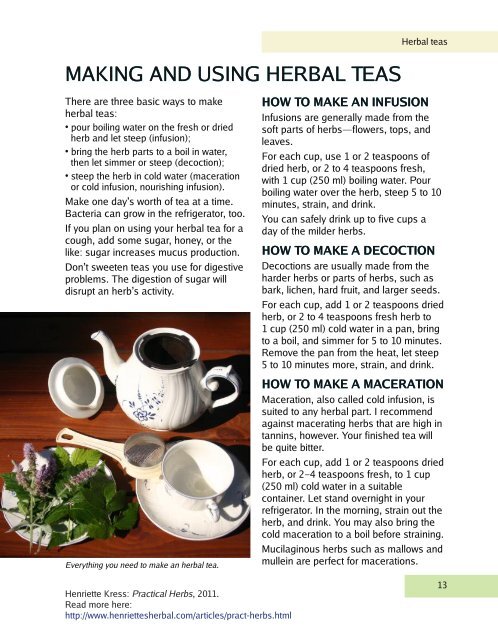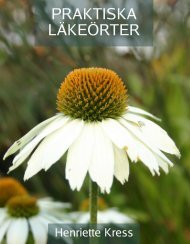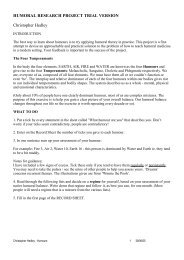practical herbs sample - Henriette's Herbal Homepage
practical herbs sample - Henriette's Herbal Homepage
practical herbs sample - Henriette's Herbal Homepage
You also want an ePaper? Increase the reach of your titles
YUMPU automatically turns print PDFs into web optimized ePapers that Google loves.
MAKING AND USING HERBAL TEAS<br />
There are three basic ways to make<br />
herbal teas:<br />
• pour boiling water on the fresh or dried<br />
herb and let steep (infusion);<br />
• bring the herb parts to a boil in water,<br />
then let simmer or steep (decoction);<br />
• steep the herb in cold water (maceration<br />
or cold infusion, nourishing infusion).<br />
Make one day’s worth of tea at a time.<br />
Bacteria can grow in the refrigerator, too.<br />
If you plan on using your herbal tea for a<br />
cough, add some sugar, honey, or the<br />
like: sugar increases mucus production.<br />
Don’t sweeten teas you use for digestive<br />
problems. The digestion of sugar will<br />
disrupt an herb’s activity.<br />
Everything you need to make an herbal tea.<br />
Henriette Kress: Practical Herbs, 2011.<br />
Read more here:<br />
http://www.henriettesherbal.com/articles/pract-<strong>herbs</strong>.html<br />
<strong>Herbal</strong> teas<br />
HOW TO MAKE AN INFUSION<br />
Infusions are generally made from the<br />
soft parts of <strong>herbs</strong>—flowers, tops, and<br />
leaves.<br />
For each cup, use 1 or 2 teaspoons of<br />
dried herb, or 2 to 4 teaspoons fresh,<br />
with 1 cup (250 ml) boiling water. Pour<br />
boiling water over the herb, steep 5 to 10<br />
minutes, strain, and drink.<br />
You can safely drink up to five cups a<br />
day of the milder <strong>herbs</strong>.<br />
HOW TO MAKE A DECOCTION<br />
Decoctions are usually made from the<br />
harder <strong>herbs</strong> or parts of <strong>herbs</strong>, such as<br />
bark, lichen, hard fruit, and larger seeds.<br />
For each cup, add 1 or 2 teaspoons dried<br />
herb, or 2 to 4 teaspoons fresh herb to<br />
1 cup (250 ml) cold water in a pan, bring<br />
to a boil, and simmer for 5 to 10 minutes.<br />
Remove the pan from the heat, let steep<br />
5 to 10 minutes more, strain, and drink.<br />
HOW TO MAKE A MACERATION<br />
Maceration, also called cold infusion, is<br />
suited to any herbal part. I recommend<br />
against macerating <strong>herbs</strong> that are high in<br />
tannins, however. Your finished tea will<br />
be quite bitter.<br />
For each cup, add 1 or 2 teaspoons dried<br />
herb, or 2–4 teaspoons fresh, to 1 cup<br />
(250 ml) cold water in a suitable<br />
container. Let stand overnight in your<br />
refrigerator. In the morning, strain out the<br />
herb, and drink. You may also bring the<br />
cold maceration to a boil before straining.<br />
Mucilaginous <strong>herbs</strong> such as mallows and<br />
mullein are perfect for macerations.<br />
13





